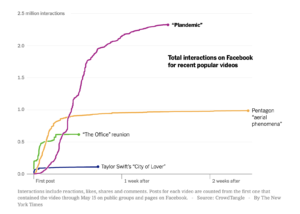Sunday in Whitewater will be cloudy with a high of eighty-three. Sunrise is 5:22 AM and sunset 8:20 PM, for 14h 57m 55s of daytime. The moon is a waxing crescent with 3.1% of its visible disk illuminated.
On this day in 1883, the Brooklyn Bridge opens to traffic after 14 years of construction.
Recommended for reading in full —
Greg Miller, Josh Dawsey, and Aaron C. Davis report Trump’s move to block travel from Europe triggered chaos and a surge of passengers from the outbreak’s center:
Epidemiologists contend the U.S. outbreak was driven overwhelmingly by viral strains from Europe rather than China. More than 1.8 million travelers entered the United States from Europe in February alone as that continent became the center of the pandemic. Infections reached critical mass in New York and other cities well before the White House took action, according to studies mapping the virus’s spread. The crush of travelers triggered by Trump’s announcement only added to that viral load.
Trump has repeatedly touted his decision in January to restrict travel from China as evidence that he acted decisively to contain the coronavirus, often claiming that doing so saved more than a million lives. But it was his administration’s response to the threat from Europe that proved more consequential to the majority of the more than 94,000 people who have died and the 1.6 million now infected in the United States
Alec MacGillis reports Rent Is Still Due in Kushnerville:
Here, there is nary a telecommuting professional to be found. Here, there is no escaping the upheaval. The need in the complexes is so great that one of them, Cove Village, has become a main distribution spot for free food from the Baltimore County school department: Every Monday through Thursday, a truck arrives at Cove Village and parks on Driftwood Court from 11 a.m. to 1 p.m. Families line up for a breakfast, lunch and snack, with an extra set given out on Thursday to tide kids over on Friday.
There is another reason to track the upheaval in these complexes. It happens that they are owned by the company led until not long ago by the person now tasked with overseeing the federal government’s response to the crisis: Jared Kushner, son-in-law of President Donald Trump. The Kushner Companies, in which Jared still holds a large financial stake, has come under scrutiny in recent years for its litigious pursuit of tenants who allegedly owed back rent or broke leases, and for the poor conditions of many of the units. It was even the subject of a Netflix television documentary that aired just as the lockdowns first went into effect.
But the pandemic has now thrust Kushnerville, which consists of nine complexes in inner-suburban Baltimore County, some with as many as 1,000 units each, into unfamiliar territory. For years, tenants have learned to dread the aggressive tactics of their landlord: late-payment notices and court summons slapped on their doors, late fees and “court costs” and attorney fees added to bills, and, in some cases, even threats of jail time. Disclosure of those tactics led to a class-action lawsuit and a lawsuit by the state attorney general. The Kushner entities have denied wrongdoing. (A judge this year denied the plaintiffs’ bid to form a class, which is on appeal; the attorney general’s suit is ongoing.)
How Australians Are Trading Solar Energy With Their Neighbors:
more >>

